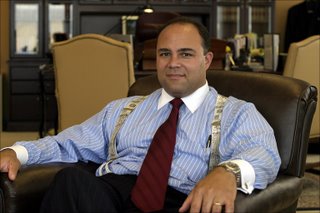
The problem with media consolidation is that it places corporate profits ahead of local coverage, while concentrating too much information power in the hands of a few companies. This concentration in turn provides those corporations the ability to shape public awareness and opinion with little opposition, and some firms have seized on that opporunity with alarming results. Sinclair Broadcasting Group, for instance, which reaches roughly a quarter of all homes in the U.S., mandated that its television stations broadcast a strongly partisan anti-John Kerry film just days before the 2004 presidential election. Likewise, in the realm of radio, Clear Channel Communications went as far as organizing pro-war rallies in the run-up to the invasion of Iraq to support President Bush, with whom company leadership has close ties.
Despite episodes like these, former Federal Communications Commission (F.C.C.) Chairman Michael Powell successfully changed media ownership rules to allow greater consolidation - and did so with only a single public hearing on the matter - despite significant outcry. He faced a storm of criticism in the wake of that decision, however, leading to a Senate resolution rolling back the rules, and a civil lawsuit that saw the regulations thrown out by a federal district court in Philadelphia. Today, another opportunity to examine rule changes surrounding media consolidation - for which large media companies continue to push - is gaining momentum.
Now it has come to light that, back in 2004, the F.C.C. ordered the outright destruction and suppression of a report strongly indicating that locally-owned television stations provide more local news coverage than do network- and non-locally-owned broadcasters. While it is likely that many draft reports are routinely suspended during the course of setting policy, this is particularly troubling given Mr. Powell’s preference for allowing media company-backed consolidation of television ownership in the face of strong public opposition.
The report came to notice during Senate hearings on the renomination of Powell’s successor, F.C.C. Chairman Kevin Martin, when it was the topic of questioning by Senator Barbara Boxer. Mr. Powell and Mr. Martin have both denied knowing about either the report or its suppression, but Senator Boxer is pushing for an investigation by the Government Accountability Office (GAO).
The manner in which the F.C.C. makes decisions is never more important than when it directly effects the way in which the public gets the news of the day. An informed citizenry is crucial to representative democracy, and given the F.C.C.’s recent high-handedness, attention to the manner in which a countervailing report was quashed is a very good thing.
Despite episodes like these, former Federal Communications Commission (F.C.C.) Chairman Michael Powell successfully changed media ownership rules to allow greater consolidation - and did so with only a single public hearing on the matter - despite significant outcry. He faced a storm of criticism in the wake of that decision, however, leading to a Senate resolution rolling back the rules, and a civil lawsuit that saw the regulations thrown out by a federal district court in Philadelphia. Today, another opportunity to examine rule changes surrounding media consolidation - for which large media companies continue to push - is gaining momentum.
Now it has come to light that, back in 2004, the F.C.C. ordered the outright destruction and suppression of a report strongly indicating that locally-owned television stations provide more local news coverage than do network- and non-locally-owned broadcasters. While it is likely that many draft reports are routinely suspended during the course of setting policy, this is particularly troubling given Mr. Powell’s preference for allowing media company-backed consolidation of television ownership in the face of strong public opposition.
The report came to notice during Senate hearings on the renomination of Powell’s successor, F.C.C. Chairman Kevin Martin, when it was the topic of questioning by Senator Barbara Boxer. Mr. Powell and Mr. Martin have both denied knowing about either the report or its suppression, but Senator Boxer is pushing for an investigation by the Government Accountability Office (GAO).
The manner in which the F.C.C. makes decisions is never more important than when it directly effects the way in which the public gets the news of the day. An informed citizenry is crucial to representative democracy, and given the F.C.C.’s recent high-handedness, attention to the manner in which a countervailing report was quashed is a very good thing.
No comments:
Post a Comment